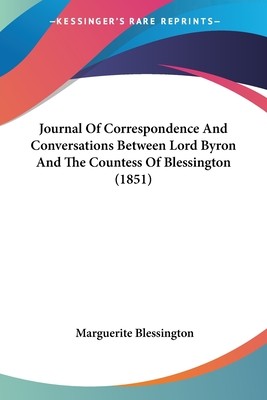
- We will send in 10–14 business days.
- Author: Marguerite Blessington
- Publisher: Kessinger Publishing
- ISBN-10: 1437088058
- ISBN-13: 9781437088052
- Format: 15.2 x 22.9 x 1.3 cm, minkšti viršeliai
- Language: English
- SAVE -10% with code: EXTRA
Journal Of Correspondence And Conversations Between Lord Byron And The Countess Of Blessington (1851) (e-book) (used book) | bookbook.eu
Reviews
Description
When the Countess of Blessington (1789–1849) met the poet Lord Byron (1788–1824) in Genoa in 1823 she noted that 'the impression of the first few minutes disappointed me'. Despite this precarious start, they struck up a friendship and met nearly every day for two months. Byron had been living in the Italian port city since the previous autumn and Blessington and her family had arrived in April 1823. Her account of their conversations was not published until 1834, a decade after Byron's death. Blessington expresses candid opinions about the poet in this work, writing that Byron 'is a strange mélange of good and evil, the predominancy of either depending wholly on the humour he may happen to be in'. Through her frankness, the author - herself a well-known writer who hosted a distinguished literary salon - also reveals much about herself and the literary world she and Byron inhabited. -Oxford UP
EXTRA 10 % discount with code: EXTRA
The promotion ends in 23d.02:50:08
The discount code is valid when purchasing from 10 €. Discounts do not stack.
- Author: Marguerite Blessington
- Publisher: Kessinger Publishing
- ISBN-10: 1437088058
- ISBN-13: 9781437088052
- Format: 15.2 x 22.9 x 1.3 cm, minkšti viršeliai
- Language: English English
When the Countess of Blessington (1789–1849) met the poet Lord Byron (1788–1824) in Genoa in 1823 she noted that 'the impression of the first few minutes disappointed me'. Despite this precarious start, they struck up a friendship and met nearly every day for two months. Byron had been living in the Italian port city since the previous autumn and Blessington and her family had arrived in April 1823. Her account of their conversations was not published until 1834, a decade after Byron's death. Blessington expresses candid opinions about the poet in this work, writing that Byron 'is a strange mélange of good and evil, the predominancy of either depending wholly on the humour he may happen to be in'. Through her frankness, the author - herself a well-known writer who hosted a distinguished literary salon - also reveals much about herself and the literary world she and Byron inhabited. -Oxford UP


Reviews